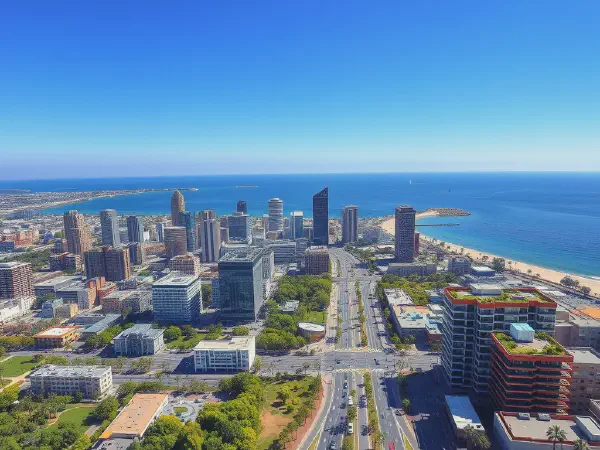Exploring Urban Development Initiatives in San Diego

Urban Development Initiatives in San Diego
San Diego, a vibrant coastal city in Southern California, has been actively pursuing various urban development initiatives aimed at enhancing the quality of life for its residents. These initiatives encompass a wide range of projects and policies focusing on sustainable growth, affordable housing, infrastructure improvements, and community engagement, making San Diego one of the leading cities in urban development efforts across the nation.
The Urban Development Initiatives in San Diego reflect a commitment to creating a sustainable urban environment that accommodates growth while preserving the unique character of the city. With a focus on revitalizing neighborhoods and promoting equitable development, the city has implemented several programs to address housing shortages, improve public transportation, and enhance green spaces. The initiatives strive to create a balanced urban ecosystem where residents can thrive economically and socially.
A significant aspect of the Urban Development Initiatives in San Diego is the emphasis on sustainable urban planning. By integrating green building practices, prioritizing public transport, and encouraging mixed-use developments, San Diego is paving the way for an eco-friendly urban landscape. The city’s planning framework is designed to foster a healthier environment while catering to the diverse needs of its population.
Moreover, affordable housing remains a cornerstone of urban development in San Diego. With rising housing costs, the city is fostering innovative solutions such as low-income housing projects, community land trusts, and inclusionary zoning policies. These measures aim to create inclusive and accessible communities, ensuring that all residents have a place to call home regardless of their economic status.
The success of modern cities relies heavily on effective Urban Development strategies that prioritize sustainability and community needs.
In addition to housing and sustainability, another crucial element of the Urban Development Initiatives in San Diego is the enhancement of parks and green spaces. By creating new parks, revitalizing existing ones, and promoting community gardens, San Diego is making strides towards improving urban livability. These efforts are vital in maintaining the city’s natural beauty while providing recreational spaces for residents to enjoy.
Sustainable Urban Planning
Green building practices in San Diego have gained momentum as part of the city's sustainable urban planning efforts. These practices include the use of energy-efficient materials, water-saving technologies, and designs that promote natural ventilation. By adhering to these green standards, new developments not only reduce the environmental impact but also create healthier living spaces for residents.
Public transportation improvements are another significant focus of the Urban Development Initiatives in San Diego. The city has invested in expanding its transit system, enhancing bus routes, and introducing light rail options. By making public transport more accessible and efficient, San Diego aims to reduce traffic congestion and encourage more residents to opt for sustainable commuting methods.
Additionally, mixed-use developments and zoning changes are being promoted as part of the urban planning initiatives. By allowing residential, commercial, and recreational spaces to coexist, San Diego is fostering vibrant neighborhoods where residents can live, work, and play without the need for long commutes. This approach not only stimulates the local economy but also enhances community cohesion.
Affordable Housing Solutions
Low-income housing projects have emerged as a key strategy to tackle the affordable housing crisis in San Diego. The city has launched several initiatives to construct affordable units that cater to low-income families, ensuring that housing is accessible to all. These projects are often coupled with supportive services to further assist residents in achieving self-sufficiency and stability.
Community land trusts represent another innovative approach towards creating affordable housing in San Diego. By acquiring land and ensuring it remains affordable, these trusts empower local communities and provide long-term housing solutions. This model not only promotes affordable living but also encourages neighborhood engagement and investment in the community's future.
Inclusionary zoning policies are being implemented by the city to mandate the inclusion of affordable units in new developments. By creating a mixed-income landscape, San Diego is striving to prevent socio-economic segregation and foster diverse communities. These policies are crucial in ensuring that a broad spectrum of residents can thrive in the city.
Parks and Green Spaces Development
The creation of new city parks is a vital aspect of the Urban Development Initiatives in San Diego. Many neighborhoods are currently experiencing the emergence of parks that provide essential green spaces for recreation and relaxation. These parks are often designed to include playgrounds, walking trails, and communal gathering areas, enhancing the overall quality of life.
Revitalization of existing parks is also a priority. Many of San Diego's historic parks have undergone significant upgrades, making them more attractive and accessible to residents. Enhancements include improved landscaping, updated facilities, and increased safety measures, fostering a sense of pride and community ownership among local residents.
Moreover, community gardens and urban farming initiatives have been gaining popularity in San Diego. These projects allow residents to cultivate their food while promoting environmental sustainability. Community gardens serve not only as a source of fresh produce but also as spaces for education, interaction, and empowerment, bringing people together to embrace urban agriculture.
Transportation and Infrastructure Improvements
Bicycle lane expansions are a primary focus for San Diego to promote alternative transportation methods. The city is actively working on creating more dedicated bike lanes, ensuring safer and more convenient cycling experiences. By prioritizing biking, San Diego aims to reduce dependence on cars, thereby alleviating traffic congestion and lowering carbon emissions.
The integration of smart city technology is another initiative being pursued to enhance urban infrastructure. By utilizing data-driven approaches, the city aims to optimize traffic management, improve security, and streamline public services. Smart technology initiatives will also enhance the overall efficiency of urban systems, contributing to a more sustainable city.
Lastly, public transit updates and expansions are being actively pursued. Yearly investments are directed towards improving existing transit services, introducing new routes, and enhancing the frequency of services. These efforts aim to provide residents with reliable public transport options, ultimately promoting a shift towards more sustainable commuting habits.
Community Engagement in Urban Development
Public forums on development projects are an essential part of community engagement in San Diego's urban planning processes. These forums provide platforms for residents to voice their opinions, ask questions, and participate in discussions regarding upcoming developments. This transparency in communication builds trust between the community and city planners.
Community advocacy groups play a crucial role in representing the voices of residents in San Diego. These organizations often collaborate with city officials and developers to advocate for better housing solutions, sustainable practices, and park developments. By being proactive, advocacy groups contribute significantly to shaping the urban landscape.
Lastly, feedback mechanisms for residents are continuously being improved to ensure that community input influences urban development decisions. Surveys, workshops, and online platforms are being utilized to gather thoughts and insights from residents, helping city leaders make informed decisions that align with the preferences of the population.
